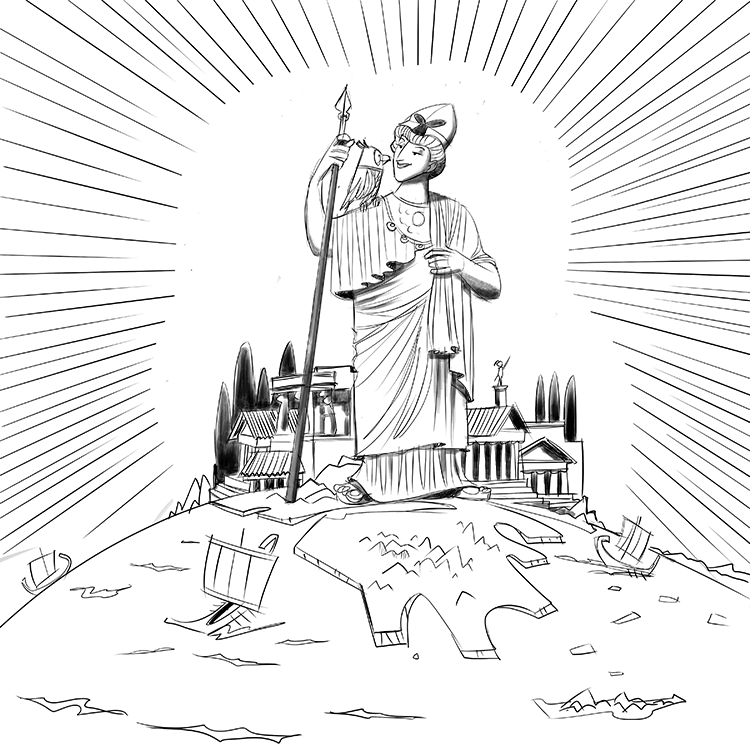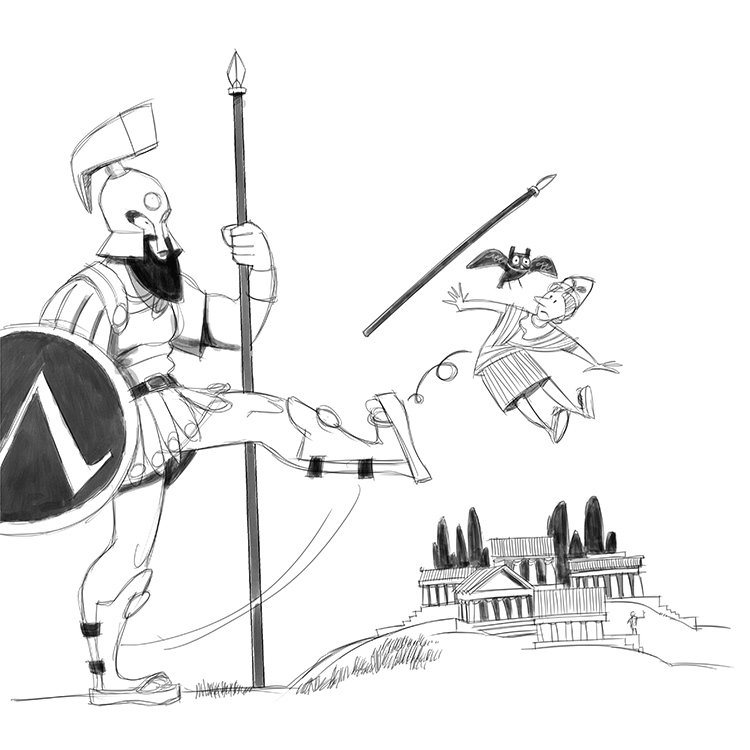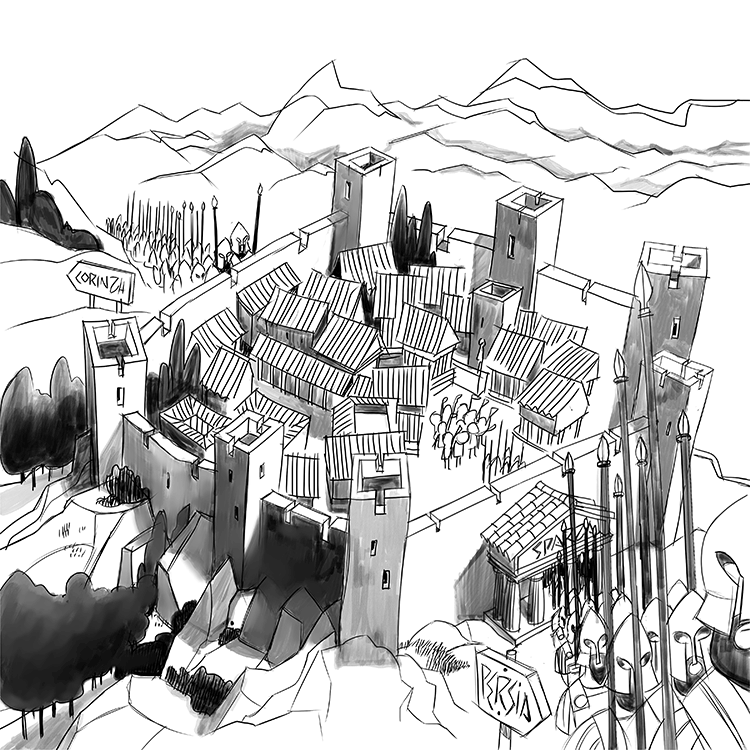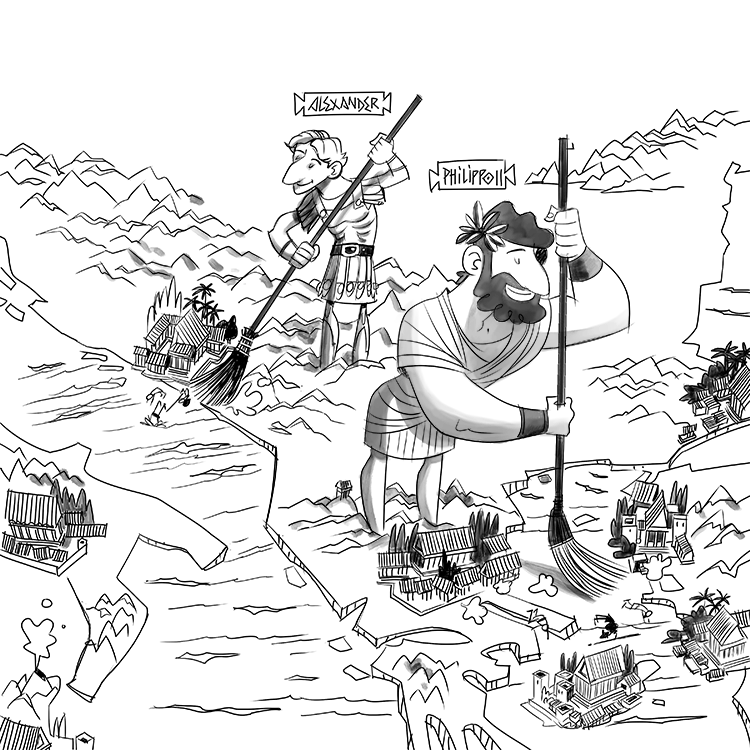For the first few centuries of the Classical Era of Ancient Greece (c. 600 – c.300 BC), civilization prospered. Through trade and warfare, the Greeks had managed to establish powerful, independent city-states throughout not only Greece but also in the lands making up the modern nations of Turkey, Italy, Israel, and more.
However, throughout all this time, a menace lurked in the background: the deep-rooted hatred between Greece’s two most powerful city-states, Athens and Sparta.

Eventually, these two powers could not be contained, their interests conflicting enough to lead to full-on war. The resulting conflict, The Peloponnesian War, raged for nearly thirty years, from 431 BC until 404 BC.
Once finished, with the Spartans emerging victorious, the relative stability that had existed throughout the Classical Era disappeared.
As a result, the next century of Greek history is marked by a radical transformation of society, one that helped lay the foundations of much of Western civilization.

The Spartan Empire
After the fall of Athens to Sparta in 404 BC, Sparta stood alone atop the Greek world. Wanting to ensure no further trouble from the Athenians, they immediately set to work solidifying their position.
The Thirty Tyrants in Athens
To start, they abolished the Athenian assembly and replaced it with a group of leaders that eventually became known as the Thirty Tyrants.
Officially Athenians, these individuals were loyal to Sparta. While in power, they instituted laws meant to oppress Athenian freedom and wealth. Also, they carried out a widespread purge of people considered politically dangerous.
In total, it’s estimated that around 5 percent of Athens’ population died during this time.
All in all, it was dark times for Athens. And Sparta was showing the world what it might look like to live under their rule.
Continuing the Fight with Persia
In addition to subjugating Athens, Sparta also conducted military campaigns in Asia, mainly against Persia. These two sides had been contesting this territory for centuries.
The Spartans managed to win several battles against the Persians. This stretched their territorial hold even further east, and it also helped them firm up their grip on the rest of Greece.
However, while the Spartan empire was strong and ruthless, it was short-lived. Similar to what happened when Athens became too powerful for its own good the century before, the rest of the Greek city-states teamed up to fight the Spartans.
This would set off a series of events that would lead to the most dramatic transformation of Greek society up until this point in history.

The Corinthian War
Spartan dominance began to crumble in 394 BC, just ten years after their victory over Athens and their imperial rise. At this time, most of the Spartan army was off fighting the Persians.
Spotting an opportunity, Corinth, a long-time Spartan rival located on the peninsula connecting the Peloponnese to mainland Greece, launched a sneak attack against the city of Sparta.
This obviously alarmed the Spartans, but it also raised eyebrows in other cities in Greece, mainly Athens and Thebes. Athens, which by now had managed to oust the Thirty Tyrants and restore democracy, was gaining in strength and power, decided to team up with Thebes and Corinth in a war against Sparta.
Interestingly, this Athens-Thebes-Corinth alliance enlisted the help of the Persians, their long-time international enemy. Seems it’s true that all is fair in love and war.
Together, this coalition managed to eat away at the Spartan empire, but not so much to remove it from power.
The Peace of Antalcidas
The peace treaty that ended the Corinthian War, The Peace of Antalcidas, played an important role in the continued degradation of political stability in Classical Greece.
The terms of the treaty gave most of the Greek cities in Ionia (located in modern-day Turkey) to the Persians. Sparta essentially abandoned them.
Furthermore, all Greek city-states were reduced to total independence. All leagues, alliances, and partnerships were dissolved, except Sparta’s Peloponnesian League.
Sparta got away easy because they were tasked with being the adult who looks after the rest of the Greek world. In other words, they were supposed to keep the peace and make sure everyone else honored the terms of the treaty.
Fallout from the Peace of Antalcidas
This irritated the rest of the Greeks for a number of reasons. First, the treaty was enforced by the Persians, who had entered the war in opposition to the Spartans. Yet by effectively naming Sparta as the leader of Greece, it seems the Persians switched sides. Perhaps it was all part of a diabolical plan to weaken the Greeks and take back territory in Asia??
Such a betrayal likely stung. But by acknowledging Spartan dominance, and also by abolishing all other Greek alliances and coalitions, the Persian-backed treaty left the rest of the Greek city-states all but helpless against Sparta.
This didn’t sit too well. So, almost immediately, there was rebellion. This time, instead of Corinth taking the charge, it was Thebes.
The Theban Wars
Thebes had itself been growing in power since the end of the Peloponnesian War. It did this largely by strengthening its Boeotian League. Similar to the Delian League led by Athens and the Peloponnesian League led by Sparta, the Boeotian League was a collection of city-states located near Thebes, on the Boeotian Peninsula.
Naturally, the Thebans weren’t big fans of the policy that made them split up their team of friends. So, shortly after it happened, just nine years in fact, in 378 BC, they went to war.
The Battle of Leuctra
In the beginning parts of the war, Thebes worked to expel Spartan forces out of Theban territory as well as the rest of Boeotia.
After seven years of this, the Thebans finally won a decisive victory at the Battle of Leuctra. In this fight, the Theban army wiped out 400 of the 700 Spartan soldiers.
This might not seem like a massive number, but the Spartan army was limited to Spartan citizens, and therefore very small. Highly-trained from childhood, they were the best soldiers of the era. But there were relatively few of them.
To qualify for service, you had to be a member of an elite group of Spartan society that could trace its roots back to the city’s original families.

The Fall of Sparta
By adhering to such a policy for so long, Sparta basically shot itself in the foot. It was a system destined to fail. It only worked as long as it did because the Spartans almost never lost a battle. But the rout at Lectra decimated their army, and sent them running to protect their homes.
It was all but over, though, for there weren’t enough soldiers to replace the dead. And the Theban army was much larger and just as well trained.
By 370 BC, the Thebans began launching campaigns into the Spartan homeland, freeing slaves and burning farmland.
Eventually, Sparta had no choice but to accept peace terms. Doing so saved the city, but it was now a shell of its former self. Never again would it return to the glory of the Classical Era.

The Rise of Macedon
After the Theban war, Greece was never the same. Thebes took its turn atop the Greek world, but this was short-lived. Athens, emboldened by Sparta’s fall, was gaining power and began challenging Thebes.
However, something else was happening, in the faraway land of Macedon, that was about to change Greek history forever: Phillip II took the throne.
An independent kingdom also populated by ethnic Greeks, Macedon had been a background player throughout the Classical Era. But as the rest of the Greek world fought, it became stronger.
When Phillip II, initially a regent, was named king, he set out on a mission to first conquer Greece and then Persia, who he still considered an enemy of the Greeks despite what had happened in the Corinthian War.
Phillip II, who took the throne in 359 BC, built and mobilized a massive Macedonian army. From there, he began moving south into mainland Greece. He made it as far south as Phocis (located in between Macedon and Athens/Thebes) before dying mysteriously at his sister’s wedding. (Perhaps a murder!)
Alexander the Great
His son, Alexander, immediately took over and continued his father’s work. But what started as a campaign to conquer Greece turned into one of the most ambitious imperial expansions of all-time.
Alexander moved swiftly through Greece, then onto Egypt and Palestine, then Persia, and across Asia all the way to India, establishing an empire unlike any other in the ancient world.
Macedon was unlike other Greek societies in that it was a more unified kingdom. The monarch had considerable control over the state and its resources. So, when Philipp II first set his sights on the rest of Greece, his first move was to direct much of Macedon’s wealth to the building and arming a fighting force that could subjugate Greece. Alexander picked up where his father left off and built an army that allowed him to conquer much of his known world.
The success of Philipp II and his son Alexander brought swift and dramatic changes to the Greek and ancient worlds. Not only were there no more independent city-states. Instead, there was one unified Macedonian kingdom.
There also was no more Egypt and Persia, two of the largest and most powerful kingdoms of western Asia, northern Africa, and the Mediterranean.
This put the Greeks firmly in control of the ancient world. Under their rule, history would change forever.
Hellenistic Greece
Like his father, Alexander the Great died unexpectedly. To this day, no one really knows what ended his life.
Upon his death, chaos ensued. His generals, all claiming to be his successor, fought amongst one another. Eventually, this led to the formation of four new kingdoms, all of which had heavy Greek influence.
Over the course of the next 100+ years, the ancient world became increasingly Greek. The Greek language became the go-to tongue for people as far west as modern-day Italy and as far east as modern-day Afghanistan. Greek scholars and philosophers traveled freely throughout this world, spreading ideas and gaining followers. And, in general, society prospered.
Roman Conquest
This would all come to an end around 150 BC, when the Romans came marching in from the west with their all-powerful armies and thirst for conquest. However, despite taking control of the Greek kingdoms of the Hellenistic Era, the Romans left much of the political and social structures already in place. They chose not to destroy them but rather to build on them.
In this way, the Greeks are in part responsible for the Roman bureaucracy that helped bring Europe together and very much laid the foundation for the modern Western world.
A Defining Era in Ancient Greece
The last century of the Classical Era, after the Peloponnesian War, is defined by a dramatic transformation in Greek history. Power shifted from Athens, then to Sparta, then to Thebes. But all this war weakened these three cities so much that they were all but helpless to the invading Macedonians.
This decline, though, is not all doom and gloom. The end of the Classical Era gave rise to a new period, one that brought the ancient world closer together and made prosperity possible, contributing greatly to the world we today call home.
Written by Matthew Jones
Illustrated by Pablo Velarde Diaz-Pache
